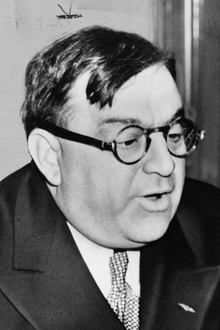
Back فيوريلو لا غوارديا Arabic فيوريلو اتش لا جوارديا ARZ فییورلو اچ. لاقواردیا AZB Fiorello La Guardia Catalan Fiorello H. La Guardia Czech Fiorello La Guardia Welsh Fiorello LaGuardia Danish Fiorello La Guardia German Fiorello H. La Guardia Esperanto Fiorello La Guardia Spanish
Fiorello H. La Guardia | |
|---|---|
 La Guardia in 1940 | |
| 2nd Director General of the United Nations Relief and Rehabilitation Administration | |
| In office April 1, 1946 – December 31, 1946 | |
| Preceded by | Herbert H. Lehman |
| Succeeded by | Office abolished |
| 99th Mayor of New York City[1] | |
| In office January 1, 1934 – January 1, 1946 | |
| Preceded by | John P. O'Brien |
| Succeeded by | William O'Dwyer |
| 5th President of the United States Conference of Mayors | |
| In office 1935–1945 | |
| Preceded by | Daniel Hoan |
| Succeeded by | Edward Joseph Kelly |
| Member of the U.S. House of Representatives from New York | |
| In office March 4, 1923 – March 3, 1933 | |
| Preceded by | Isaac Siegel |
| Succeeded by | James J. Lanzetta |
| Constituency | 20th district |
| In office March 4, 1917 – December 31, 1919 | |
| Preceded by | Michael F. Farley |
| Succeeded by | Nathan D. Perlman |
| Constituency | 14th district |
| 10th President of the New York City Board of Aldermen | |
| In office January 1, 1920 – December 31, 1921 | |
| Preceded by | Robert L. Moran |
| Succeeded by | Murray Hulbert |
| Personal details | |
| Born | Fiorello Enrico Raffaelo La Guardia December 11, 1882 New York City, U.S. |
| Died | September 20, 1947 (aged 64) New York City, U.S. |
| Resting place | Woodlawn Cemetery |
| Political party | Republican |
| Other political affiliations | Roosevelt Progressive (1916) American (1916) Democratic (1918) LaFollette Progressive (1924) Socialist Party of America (1924) Progressive Labor (1926) City Fusion (1933–1941) American Labor (1937–1941) Ind. Progressive (1937) United City (1941) |
| Spouses | Thea Almerigotti
(m. 1919; died 1921)Marie Fisher (m. 1929) |
| Children | 3 |
| Education | Timothy Dwight School |
| Alma mater | |
| Profession | Politician |
| Signature | |
| Military service | |
| Branch/service | United States Army Air Service |
| Years of service | 1917–1919 |
| Rank | Major |
| Battles/wars | |
Fiorello Henry La Guardia[a] (born Fiorello Raffaele Enrico La Guardia;[b] December 11, 1882 – September 20, 1947) was an American attorney and politician who represented New York in the U.S. House of Representatives and served as the 99th mayor of New York City from 1934 to 1946. He was known for his irascible, energetic, and charismatic personality and diminutive, rotund stature.[c] An ideologically socialist member of the Republican Party, La Guardia was frequently cross-endorsed by parties other than his own, especially parties on the left under New York's electoral fusion laws. A panel of 69 scholars in 1993 ranked him as the best big-city mayor in American history.[2]
Born to a family of Italian immigrants in New York City, La Guardia quickly became interested in politics at a young age. Before his mayoralty, La Guardia represented Manhattan in the U.S. House of Representatives and later served in the New York City Board of Aldermen. Amidst the Great Depression, La Guardia campaigned on his support for Franklin D. Roosevelt and his New Deal programs and won the 1933 election. As mayor during the Great Depression and World War II, La Guardia unified the city's transit system; expanded construction of public housing, playgrounds, parks, and airports; reorganized the New York Police Department; and implemented federal New Deal programs within the city. He pursued a long series of political reforms, curbing the power of the powerful Irish-controlled Tammany Hall political machine that controlled the Democratic Party in Manhattan. He also re-established merit-based employment and promotion within city administration.[3]
La Guardia was a highly visible national political figure. His support for the New Deal and relationship with President Roosevelt crossed party lines, brought federal funds to New York City, and cut off patronage to La Guardia's Tammany enemies. La Guardia's WNYC radio program "Talk to the People", which aired from December 1941 until December 1945, expanded his public influence beyond the borders of the city.[4]
- ^ "The Green Book: Mayors of the City of New York" Archived May 14, 2012, at the Wayback Machine on the official NYC website.
- ^ Melvin G. Holli, The American Mayor: The Best and the Worst Big-City Leaders (Pennsylvania State UP, 1999), p. 4–11.
- ^ Kessner 1989.
- ^ "Talk to the People | WNYC". WNYC. Archived from the original on June 14, 2018.
Cite error: There are <ref group=lower-alpha> tags or {{efn}} templates on this page, but the references will not show without a {{reflist|group=lower-alpha}} template or {{notelist}} template (see the help page).